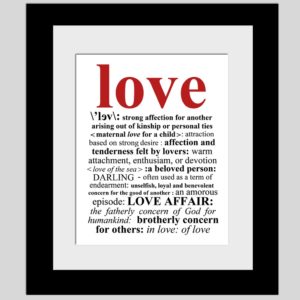 Philosophers and poets have struggled with this question for thousands of years. Psychologists recently started examining the same question, but with limited success.
Philosophers and poets have struggled with this question for thousands of years. Psychologists recently started examining the same question, but with limited success.
The first thing we should acknowledge is that all emotions, including “love,” are very difficult to define. Love, though, is exceptionally difficult; possibly because of the limitations of the English language.
 You can, for example, love your mom for always protecting you and being on your side. You can also love your best friend for laughing with you and being the first to answer your texts. You can love your romantic partner in a far more intense, intimate, and passionate way than your other relationships. And you can love pizza!
You can, for example, love your mom for always protecting you and being on your side. You can also love your best friend for laughing with you and being the first to answer your texts. You can love your romantic partner in a far more intense, intimate, and passionate way than your other relationships. And you can love pizza!
That’s a lot of pressure on one word. The ancient Greeks had eight words for different types of love:
- Eros (romantic or passionate love) –Named after the Greek God of fertility, Eros is passion, lust and pleasure. It’s an appreciation for one’s physical being or beauty, and is driven by attraction and sexual longing. It describes desire and obsession and is most similar to what we think of as romantic, passionate love between life partners. At least in the earlier stages of a relationship, when everything is crazy-hot and you can’t get enough of each other. The ancient Greeks considered Eros to be dangerous and frightening as it involves a loss of control, through the primal impulse to procreate. Eros is an intense form of love that arouses romantic and sexual feelings.
 Ludus (playful love) –While philia could be a matter of great seriousness, another type of love valued by the ancient Greeks, was playful love. Ludus describes the playful affection between children or casual lovers. It is infatuation, toying, flirtation. It describes the situation of having a crush and acting on it. It’s rooted in having fun, whatever that means specifically to you. Ludus is definitely the love you’d experience with a fling—casual, sexual, exciting, and with zero implications of obligation. Dancing with strangers may be the ultimate ludic activity, almost a playful substitute for sex. Social norms may frown on this kind of adult frivolity, but a little more ludus might be just what we need to spice up our love lives. Of all the Greek words for love, this one more than others comes without any eros or philia attachment.
Ludus (playful love) –While philia could be a matter of great seriousness, another type of love valued by the ancient Greeks, was playful love. Ludus describes the playful affection between children or casual lovers. It is infatuation, toying, flirtation. It describes the situation of having a crush and acting on it. It’s rooted in having fun, whatever that means specifically to you. Ludus is definitely the love you’d experience with a fling—casual, sexual, exciting, and with zero implications of obligation. Dancing with strangers may be the ultimate ludic activity, almost a playful substitute for sex. Social norms may frown on this kind of adult frivolity, but a little more ludus might be just what we need to spice up our love lives. Of all the Greek words for love, this one more than others comes without any eros or philia attachment.- Pragma (enduring, longstanding love) — Pragma is a love built on commitment, understanding and long-term best interests, like building a family. Over time, eros can turn into pragma as a couple grows to honor, respect, and cherish each other, accepting of differences and learning to compromises to help the relationship work over time. It is everlasting love rooted in romantic feelings and companion. It is a love that has aged, matured and about making compromises to help the relationship work over time, also showing patience and tolerance. The psychoanalyst Erich Fromm said that we expend too much energy on “falling in love” and need to learn more how to “stand in love.” Pragma is precisely about standing in love—making an effort to give love rather than just receive it.
- Philia (affectionate love) — The ancient Greeks valued, Philia, or friendship, far more by than the base sexuality of eros. Philia concerned the deep comradely friendship that developed between brothers in arms who had fought side by side on the battlefield. It was about showing loyalty to your friends, sacrificing for them, as well as sharing your emotions with them. Plato felt that physical attraction was not a necessary part of love, hence the use of the word platonic to mean, “without physical attraction.”
- Agape (empathetic, selfless, universal love) — Agape is selfless universal love, such as the love for strangers, nature, God or the less fortunate. It’s generally an empathetic love toward humanity itself and is sometimes connected to altruism since it involves caring for and loving others without expecting anything in return. This sort of pay-it-forward love—people helping others selflessly—is the foundation of great societies and communities. This love is unconditional, bigger than ourselves, a boundless compassion and an infinite empathy that you extend to everyone, whether family members or distant strangers. Agape was later translated into Latin as caritas, which is the origin of the English word “charity.”
- Storge (unconditional familiar love) — Storge is a natural form of affection often experienced between family members. You might love your sister, even if you don’t like her, for instance, and you might love your dad, despite the mistakes he made in raising you. Storge is driven by familiarity and need and is sometimes thought of as a one-way love. For instance, consider a mother loving her baby before the baby is aware enough to love her back. Storge can also describe a sense of patriotism toward a country or allegiance to the same team.
- Mania (obsessive love) — When love turns to obsession, it becomes “mania.” Stalking behaviors, co-dependency, extreme jealousy, and violence are all symptoms of Mania.
- Philia (intimate, authentic friendship) — Characterized by intimacy, knowing, and soul-to-soul bonds, Philia is encouraging, kind, and authentic; the stuff from which great friendship is made, regardless of whether it’s with a platonic best friend or a romantic partner. This love is also based in goodwill, or wanting what’s best for the other person. Philia is a connection akin to that of soul mates; it’s one part destiny, another part choice.
- Philautia (self love) — Self-love is hardly a new concept, as evidenced by the ancient Greeks having a word to describe it. The Greeks understood that in order to care for others, we must first learn to care for ourselves. As Aristotle said “All friendly feelings for others are an extension of a man’s feelings for himself.”